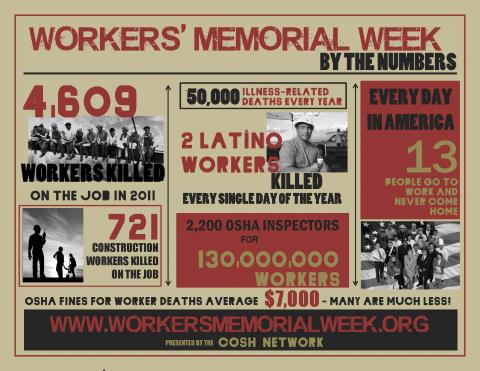Dorry Samuels, National COSH: Reflecting on a Powerful Workers’ Memorial Week of Action

During Workers’ Memorial Week of Action, which spanned April 22-28, workplace safety advocates, workers’ centers, unions, faith-based groups, and other activists across the country held events, released reports, and shared stories of workers who have been injured or killed on the job.
Reports were released by the National Council for Occupational Safety and Health (National COSH), MassCOSH, NYCOSH, and Worksafe in conjunction with SoCalCOSH, not to mention reports in North Carolina and Tennessee.
At a Workers’ Memorial Day event in Philadelphia, PhilaPOSH convened nearly 300 people – activists, lawmakers, and family members whose loved ones were killed or injured on the job – and held a procession through the streets of the City of Brotherly Love.
In New York, NYCOSH, the New York City Central Labor Council, and the New York City Labor Religion Coalition held a Workers’ Memorial Day event at a parking garage where a parking attendant drowned during Superstorm Sandy.
In addition to these events and similar ones across the country, National COSH developed infographics and led a Twitterstorm depicting the prevalence of worker fatalities and who is most affected by them. The organization also kept busy throughout the week giving many interviews to the media, with coverage from NPR, the Center for Public Integrity, New York Public Radio, NBC News, and In These Times, among other outlets.
Throughout the week of action, National COSH highlighted the stories of workers killed on the job and compiled the stories in an online story bank. (Email to add more stories.)
For example, the death of 21-year-old Lawrence Daquan “Day” Davis on his first day on the job as a temporary worker at the Bacardi Bottling Company in Jacksonville, Fla., highlights the need for adequate training and protection of temporary workers – which now comprise 25 percent of the workforce – from workplace hazards.
In its report, “Preventable Deaths: The Tragedy of Workplace Fatalities,” National COSH details several recommendations for keeping workers safe on the job, including:
• Meaningful immigration reform, which would bring undocumented workers out of the shadows and give them protections afforded to all workers.
• A stronger Occupational Safety and Health Act, which would make felony charges possible when repeat or willful violations result in a worker’s death or serious injury, and would increase the penalties OSHA can impose on negligent employers.
• An Injury and Illness Prevention Standard, which would require employers to find and fix health and safety hazards in the workplace.
• State legislation to protect temporary workers on the job, which can be modeled after Massachusetts’ new Temporary Workers Right to Know Law.
• State legislation to implement minimum penalty amounts for serious safety citations related to workplace fatalities, which can be modeled after Minnesota’s legislation that requires its state OSHA program to levy fines of no less than $25,000 for every serious violation and, in cases involving repeat or willful violations, no less than $50,000.
“Each worker killed is a tragic loss to the community of family, friends and co-workers – and the worst part is, these deaths were largely preventable,” said Tom O’Connor, executive director of National COSH. “Simply by following proven safety practices and complying with OSHA standards, many of these more than 4,600 deaths could have been avoided. But as companies decry regulations and emphasize profits over safety, workers pay the ultimate price.”
Added Barbara Rahke, executive director of the Philadelphia Project on Occupational Safety and Health (PhilaPOSH) and a National COSH board member, “With nearly 13 workers being killed on the job every day, it is essential to enact reforms to ensure that workers make it home safely at the end of every shift.” She further said “Together, we can point to regulatory and employer shortcomings and push for reforms to make workplaces safer – for all workers in all industries.”
In addition to raising awareness of workplace injuries and fatalities, and honoring the workers who died on the job, National COSH hopes that the groups who gathered to commemorate Workers’ Memorial Day continue to be active in supporting worker health and safety throughout the year. For information about how to stay involved, visit www.coshnetwork.org.
Dorry Samuels is the Communications Manager for the National Council for Occupational Safety and Health (National COSH). To learn more about the work of National COSH, visit http://www.coshnetwork.org/
